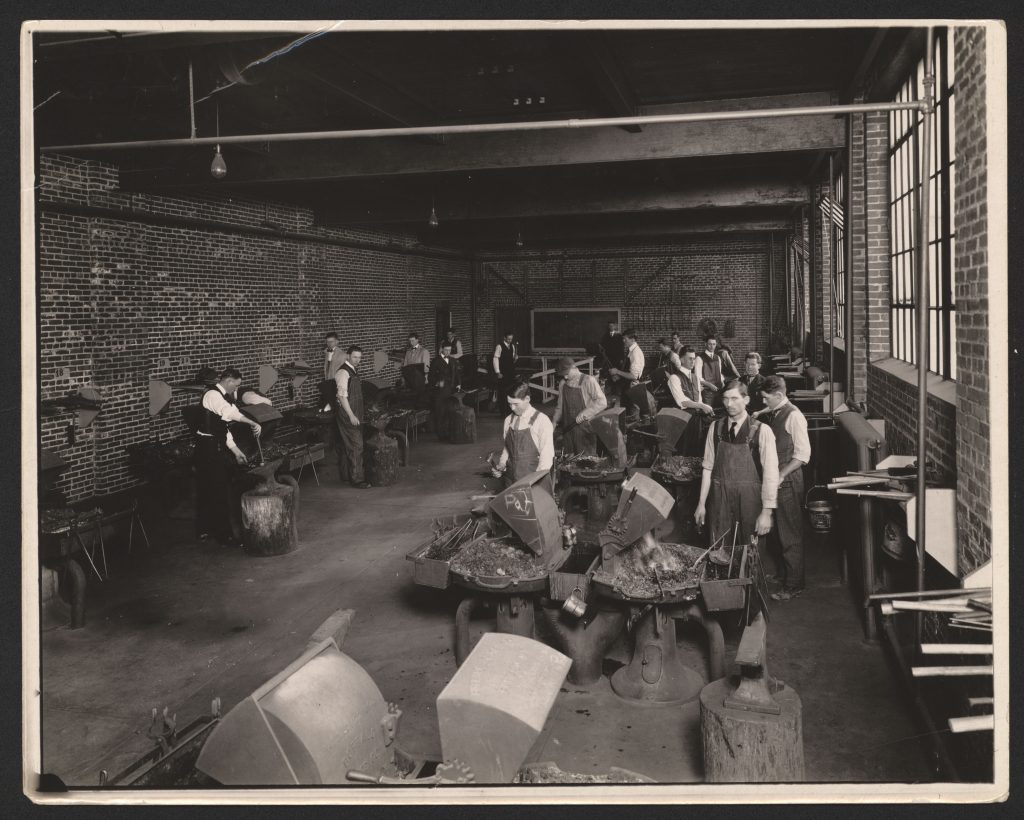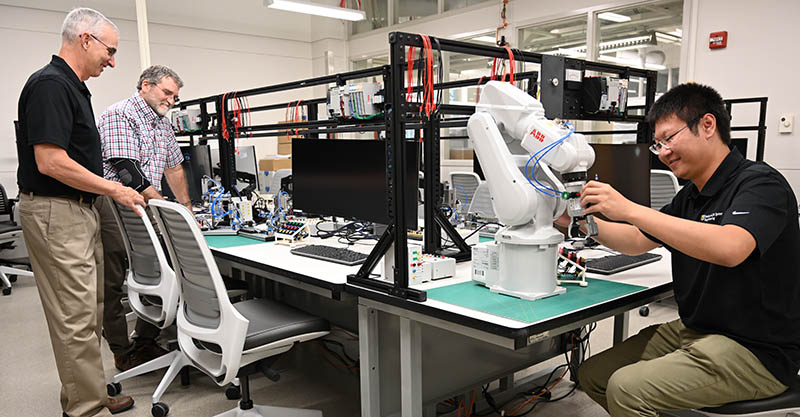December 09, 2024
This year marks 100 years since the industrial engineering program was established at Mizzou. Since then, the program has graduated successful engineers and leaders across industries.

At Mizzou Engineering, our passionate legacy is essential to who we are, and for the past 100 years, industrial engineering (IE) graduates have created a better world.
During its first year in 1924, less than two decades after the first industrial engineering program was established at Penn State, Mizzou’s program covered subjects including factory organization and management, employment problems, labor supply and other similar subjects. Now, students engage in coursework and research discovering artificial intelligence (AI), human-computer interaction, advanced manufacturing and more.
“At Mizzou, our program started as an option within the mechanical engineering department,” Jim Noble, who has been department chair since 2020, said. “While there is some overlap from the shared realm of manufacturing, the fields are very different. We focus more on operations, system design, and human factors issues and continue to evolve by incorporating elements of computer science and AI as they relate to the ever changing demands of the modern corporation.”
Mizzou has always been on the leading edge of industrial engineering. The Department of Industrial Engineering was established at the College in 1958, only 10 years after the American Institute of Industrial Engineers, now known as the Institute of Industrial and Systems Engineers (IISE), was founded.
Henry Wiebe, BS IE ‘60, retired vice provost of global learning at Missouri University of Science and Technology, and 2021 inductee to the Mizzou Athletics Hall of Fame, graduated shortly after the department was established. He said that his Mizzou IE experience was eye-opening after being recruited to the University for track and field.
“I was a first-generation college student and had no prior concept of college life,” he said. “However, it helped me develop into an adult and realize that there were responsibilities beyond athletics. I suspect that classes were smaller within the department during the early years… and more importantly, there were no sophisticated IE labs comparable to the ones existing today where students can apply concepts learned during prior lectures.”

According to Noble, the department really came alive in the 70s. The department did a lot of extension teaching, educating industry professionals across the state. It also secured a large grant from the National Institutes of Health (NIH) to develop a PhD program in healthcare operations research and analytics.
“Mizzou was the University for this work at the time,” he said. “It put us on the map in a big way, and we’ve continued to do work in this area since then.”
Developing leaders
David Haffner, BS IE ‘74 shared that his experience on campus was integral to his corporate rise to chairman and CEO of Leggett & Platt, Inc., one of the largest public companies in America.
“Big campus life was exhilarating for a small-town boy from the Ozarks,” he said. “Engineering classes were interesting and challenging while off-campus activities were a blast. All of the faculty positively affected me. I wanted a career that allowed me to combine my technical skills with my interest in business management, and the Mizzou IE undergraduate degree provided me with an extraordinary foundation on which to build further education and practical experience.”
Noble, Wiebe and Haffner all emphasized the breadth of opportunities that can come from an industrial engineering degree. The Industrial and Systems Engineering Hall of Fame (ISE HoF) has over 100 alumni in leadership roles whose careers have made a significant impact within their fields, or who have made outstanding contributions to the Department.
Liz Trimble, BS IE ‘00, was inducted into the ISE HoF in 2023. She wanted to pursue IE because of her aptitude for math and science in high school and because IE was the perfect blend of process engineering and social skills to connect people and teams.
“An IE degree equips you with the versatility to work in any sector,” Trimble said. “I’ve worked in a manufacturing facility. I’ve worked in product development bringing an artist’s concept to life, designing it for manufacturing. I’ve worked in airplane hangars custom designing the interior of private jets. I’ve worked in hospital operations. I’ve worked in managed care. This degree can take you anywhere.”

In the fall of 2000, Cerry Klein took over as the sixth chair of the department. Klein was also inducted into the ISE HoF in 2017 and personally invited Noble to join Mizzou’s faculty in 1992. Nine years later, his son Nicolas graduated from the industrial engineering program after starting out as a pre-med student.
“The ability to be a difference maker in peoples’ lives was the draw to the medical field and being an IE was another avenue to achieve that,” Nicolas Klein, BS IE ’09, MS IE ’14, said. “The coursework was challenging and sequenced in a way that it built critical thinking skills one layer at a time. Departmental events maintained a close-knit community that felt like what books describe classical education to be. This education prepares students to fill the gap in industry where technology and process intersect and to take on leadership roles that will shape the future.”
The future of industrial engineering
The opportunities that come from an IE degree are substantial. The U.S. Bureau of Labor Statistics projects that the 2023-2033 job outlook for industrial engineers will grow at 12%, the second-fastest of all engineering fields.
“At its core, industrial engineers integrate technology and people,” Noble said. “It’s a unique aspect of what we are. I’m excited to see the new opportunities technology like AI creates, especially as we tie together the trifecta of technology, data and people. The people are key to what IE brings to the table.”

two existing manufacturing core labs.
Current industrial students at Mizzou share that sentiment. Ella Swaters, a junior, chose IE because of how it empowers people to think critically and analytically while being applicable across a variety of industries.
“I have had an incredible experience with Mizzou IE,” Swaters said. “I have had the ability to connect one-on-one with my professors and classmates, which has allowed me to create a community within the College of Engineering and Mizzou as a whole. And the coursework has prepared me for various internships and career opportunities, allowing me to excel in the workplace.
“An industrial engineering degree is a great choice if you want a career that’s both flexible and impactful,” she said. “The work is satisfying because you’ll see how your efforts make processes more efficient and improve people’s lives. I feel fortunate to be part of a program that encourages growth, fosters lasting relationships, and prepares us to excel both as engineers and as individuals.”
Advice from Mizzou IE alumni
“Don’t be afraid of challenges. You are better prepared to address them than most individuals because you not only see the technical issues but also understand how they relate to the broader business environment in which they exist.” – Henry Wiebe, BS IE ‘60
“Remember, technologies have short half-lives. Work diligently to stay on the leading edge of the technologies that you utilize in your post-collegiate initiatives. Learn and practice good business management skills. You’ll need them.” – David Haffner, BS IE ‘74
“Be curious. So much can be discovered by asking simple, probing questions. Be a lifelong learner. Your education doesn’t stop here. One of the areas I’m passionate about now is user design and user experience.” – Liz Trimble, BS IE ‘00
“Don’t let technology limit the curiosity of the ‘why.’ There are so many tools that can reduce the time to do assignments that it can be easy to just execute. Learn why and how things work (like reducing a matrix) so you can apply the concepts and be the one who can figure things out and provide value in the business world. The people who are willing to take on any challenge and find a way are the ones who will succeed.” – Nicolas Klein, BS IE ‘09, MS IE ‘14
Our history of success inspires excellence and collaboration. Join Mizzou Industrial Engineering’s Legacy. Apply today!